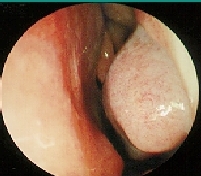
Rhinology/Allergy Pages
Allergy philosophy overview
At MetroHealth we believe in a three tiered approach to allergy treatment:
1) avoidance / environmental control, 2) allergy pharmacotherapy, 3) allergy immunotherapy vaccine. Depending on you symptoms, sensitivities, and severity, you may need to employ one, two, or three of these approaches. We will work with you to develop a specific treatment regimen that suits your individual needs.
(1) Avoidance / environmental control
This strategy involves ways to minimize you exposure to the particular allergens which you are sensitive to. You will be given additional handouts and product brochures regarding this. Some general hints to avoid the allergens and control your environment are:
animals: Getting rid of the pet is the best, though frequently impossible, solution. Keep the pet out of the bedroom or out of the house. Washing your cat(s) would need to be done every three days in order to be effective, therefore it is not recommended. One of the best techniques to minimize the allergen load in your home is to frequently clean the area where your pet sleeps..
dust mites: These microscopic creatures live in the same places that you do. Mites live in places such as bedding, pillows, carpets, and upholstered furniture. They like heat and humidity. To minimize their effect you need to minimize their habitat: wrap the mattress and pillows in mite-proof cases; wash/dry bedding weekly on hot; replace carpet with tile, linoleum, or hard wood flooring; vacuum carpets and rugs with a good vacuum (preferentially with a HEPA filter); using acaracides on carpeting to kill mites is expensive and not too effective.
pollens: Windy, warm days will have the highest pollen counts. After spending time outside exposed to the allergen, remove your clothes (which contain pollen), shower, and rinse your nose out with a saline spray. Do not dry clothes and linen on a line outside where the pollens can stick to the drying fabric. Air conditioning and HEPA filters will clean the indoor air of allergen particles.
(2) Allergy pharmacotherapy (drugs)
Your allergist will prescribe medications, and recommend over-the-counter drugs, to help to minimize your allergy symptoms. Such drugs may include antihistamines, nasal steroid sprays, cromolyn, and nasal saline sprays. There is a wide array of allergy medication; with a little time and patience we will be able to come up with a treatment regimen that works and is not too bothersome.
(3) Allergy immunotherapy vaccine (allergy shots)
Patients whose symptoms are severe and/or persist over multiple seasons are candidates to receive allergy shots. The vaccine contains the allergens that you are sensitive to, in the concentrations that we determined during your allergy testing. Shots are given weekly in gradually increasing doses (build-up phase) until we reach a maintenance dose; you remain on maintenance weekly for about a year, and then we gradually reduce the frequency of the injections to every other week, and then every third week. A typical course of shots runs 2 to 5 years. There is a small risk of causing an anaphylactic reaction to the shot, especially during the build-up phase, so it is important to receive your shots in a physician�s office. We then ask you to wait for twenty minutes in the waiting room to insure no reaction takes place. It is a considerable time commitment to take shots, though it is a chance at curing your allergies and reducing your need to take allergy medications. Allergy shots greatly benefit asthma symptoms as well.